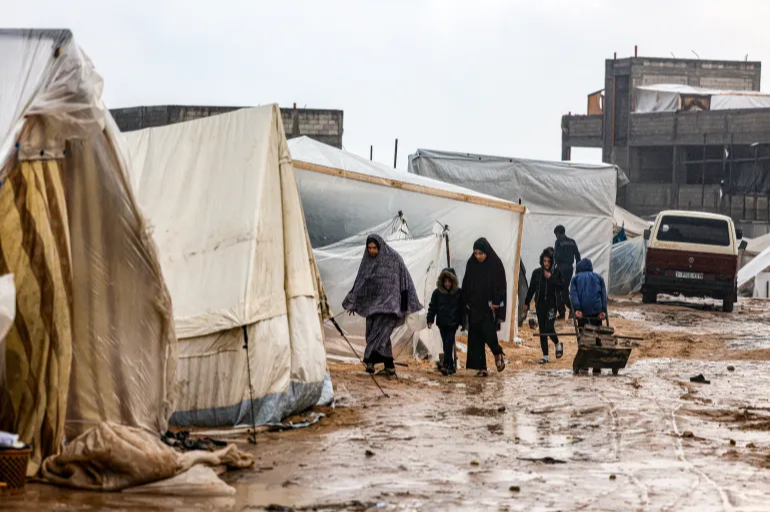
Palestinians walk under the rain at a camp in Rafah in southern Gaza [Mahmud Hams/AFP]
Rafah, December 14 (RHC)-- Heavy rains and cold winds in Gaza overnight have worsened the misery of displaced Palestinian families forced from their homes and now huddling in flimsy and flooded tents. At a tent camp in Rafah, located on sandy terrain strewn with rubbish, people were seen trying to recover from a horrible night, carrying buckets of sand to cover puddles inside or around their tents, and hanging up soggy clothes.
Some families have proper tents, but others are making do with tarpaulins or thin, see-through plastic made to protect goods, not provide shelter to people. Many tents had no groundsheets, so people spent the night huddling on wet sand.
Aziza al-Shabrawi tried in vain to get the rainwater out of her family’s tent, pointing to her two children living in such precarious conditions. “My son is sick because of the bitter cold and my daughter is barefoot. It’s like we are beggars,” said the 38-year-old. “No one cares, and no one helps.”
Yasmin Mhani said she woke up in the night to find her seven-month-old child soaking wet. Her family of five are sharing a single blanket after their home was destroyed by an Israeli air strike and they lost one of the children, as well as all their possessions.
“Our house was destroyed, our child was martyred and I remain facing it all. This is the fifth place we have had to move to, fleeing from one place to another, with nothing but a T-shirt on,” she said, hanging wet clothes outside her tent. Videos shared on social media showed people wading through flooded streets as they carried family members killed in the Israeli bombardment and wrapped in white shrouds. The heavy rains and strong winds have made it harder to bury the dead.
Al Jazeera correspondent Tareq Abu Azzoum, reporting from al-Mawasi in southern Gaza, said the rainfall has sparked new challenges for a majority of Palestinians. “It’s especially worrying for those who evacuated their houses and followed the orders of the Israeli occupation forces to flee to the south,” he said. “People here face a dramatic and deteriorating situation as they have moved from living in concrete houses to camps with tents that lack all kinds of basic needs.”
The Palestinians in Gaza have been fleeing south in tens of thousands by any means necessary – car, truck, horse-drawn cart, or on foot – turning Rafah into a sea of tents and makeshift shelters of wood and plastic sheeting.
The United Nations says people fled south to face “catastrophic circumstances” with crowds waiting for hours around distribution centres for meagre supplies of water, food and medical aid, while disease runs rampant through the squalor, made worse by rain and flooding.
Rafah, next to the border with Egypt, is the southernmost part of the Gaza Strip, where people have been arriving in growing numbers to seek refuge from intense fighting between Israel and Hamas, now raging in both the north and south. Hundreds of tents have been erected in Rafah using wood and plastic sheets.
“We spent five days outdoors. And now the rain has flooded the tents,” said another displaced resident, Bilal al-Qassas. “Where do we migrate to? Our dignity is gone. Where do women relieve themselves? There are no bathrooms,” said the 41-year-old. “We’ve started to long for martyrdom. We don’t want to eat or drink.”
The UN humanitarian agency says people are in “desperate need of food, water, shelter, health, and protection.” “Without enough latrines, open-air defecation is prevalent, increasing concerns of further spread of disease, particularly during rains and related flooding,” the UN’s OCHA said in a statement.
Inas, a 38-year-old mother of five, said she and her family had been forced to flee four times since the war started – first from the at-Twam area in northern Gaza City to the Tal al-Hawa neighbourhood, then to Nuseirat refugee camp in central Gaza, then to the city of Khan Younis, and now to Rafah. The family previously owned a five-floor house and a supermarket, which have been completely destroyed, she said. “I hope the war ends and the Israeli occupation forces don’t invade Rafah on the ground. I am terrified of the possibility of displacement to Egypt,” she said, voicing a common fear among Palestinians in Gaza.
“That is our worst nightmare. Are they going to expand the ground war to Rafah? If that happens where should we go? To the sea or to Sinai?” she said, referring to Egypt’s vast desert region just south of Gaza and Israel. “We urge the world to stop Israel. We don’t want to leave Gaza,” she said.
Israel denies having any plans to push Palestinians into Sinai, while Egypt has said it did not want a mass arrival of people from Gaza.
However, the Gaza-Egypt border fence has been breached in the past, fuelling fears that an uncontrolled displacement could happen this time.
Israel’s bombardment on Gaza has killed more than 18,000 people, mostly women and children, according to Palestinian health authorities, with thousands more feared buried in rubble.
Israel says 1,147 people were killed after Hamas fighters stormed across the border fence on October 7 and seized 240 captives, nearly half of whom have been released.

